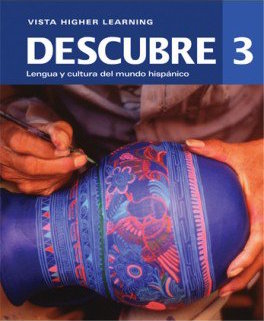
All Solutions
Page 137: Practica
You could write:
*No están seguros de que Pedro pueda dejar de fumar.*
They are not sure that Pedro can stop smoking.
You could write:
*No es evidente que estés agotado.*
It’s not clear that you’re tired.
You could write:
*Creo que las medicinas naturales son curativas.*
I think that natural medicines are healing.
You could write:
*No es verdad que la cirujana quiera operarte.*
It’s not true that the surgeon wants to perform surgery on you.
You could write:
*Es seguro que este médico conoce el mejor tratamiento.*
It’s sure that this doctor knows the best treatment.
The correct form of the verb for a dependent clause following an expression of emotion is the subjunctive **esté**.
The correct form of the verb for a declarative sentence declaring a like/dislike is the infinitive **tomar**.
The correct form of the verb for a declarative sentence in the third person is the indicative **come**.
The correct form of the verb for a dependent clause following an expression of emotion is the subjunctive **haga**.
The correct form of the verb for a declarative sentence in the first person is **pido**.
The correct form of the verb for a dependent clause following an expression of will is the subjunctive **venga**.
The correct form of the verb for an expression of preference in a declarative sentence in the third person is the infinitive **quedarse**.
The correct form of the verb for a declarative sentence in the third person is the indicative **sigue**.
The correct form of the verb for a conditional sentence in the third person is the subjunctive **permanezca**.
The correct form of the verb for a dependent clause in an expression of need is the infinitive **descansar**, as a complement to the verb “be”.
The correct form of the verb for a declarative sentence in the third person is the indicative **compra**.
The correct form of the verb for a dependent clause following an expression of need is the subjunctive **hablemos**.
The correct form of the verb for a conditional sentence in the third person is the subjunctive **llame**.
The correct form of the verb for a declarative sentence in the second person is the indicative **tienes**.
The correct form of the verb for a dependent clause following an expression of emotion is the subjunctive **escuche**.
* The verbs are:
aconsejar: advise
es importante: it’s important
es necesario: it’s necessary
querer: want
recomendar: recommend
sugerir: suggest
* The expressions are:
comer frutas y verduras: eating fruit and vegetables
descansar: resting
hacer más ejercicio: exercising more
ir al gimnasio: going to the gym
seguir las recomendaciones del médico: following doctor’s advice
tomar las medicinas: taking your medicine
1. *Te aconsejo que sigas las recomendaciones del médico.*
I advise you to follow the doctor’s advice.
2. *Es importante que comas frutas y verduras.*
It’s important that you eat fruit and vegetables.
3. *Es necesario que tomes las medicinas.*
It’s necessary that you take your medicine.
4. *Te recomiendo que descanses.*
I recommend that you rest.
5. *Te sugiero que vayas al gimnasio.*
I suggest that you go to the gym.
The correct plural third-person subjunctive form of the verb *tocar* is **toquen**.
The correct plural third-person subjunctive form of *caer* is **caigan**.
The correct singular third-person subjunctive form of *dejar* is **deje**.
The correct singular third-person subjunctive form of *poder* is **pueda**.
The correct singular third-person subjunctive form of *besar* is **bese**.
1. I wish that dreams…
You could write: *Ojalá que los sueños se hagan realidad.*
I wish that dreams come true.
2. I wish that the night…
You could write: *Ojalá que la noche te trate con gentileza.*
I wish that the night treats you kindly.
3. I wish that the wound…
You could write: *Ojalá que la herida sane sin dolor.*
I wish that the wound heals without pain.
4. I wish that a person…
You could write: *Ojalá una persona cure tu tristeza.*
I wish that a person heals your sadness.
* aconsejar: advise
es importante: it’s important
es malo: it’s bad
es mejor: it’s better
es necesario: it’s necessary
insistir en: insist on
proponer: propose
recomendar: recommend
rogar: beg
sugerir: suggest
1. *Le ruego que se duche.*
I beg that he showers.
2. *Le aconsejo que ordene su habitación.*
I advise him to clean his room.
3. *Es importante que Roberto haga ejercicio.*
It’s important that Roberto exercises.
4. *Es mejor que Roberto se corte el cabello.*
It’s better that Roberto cuts his hair.
5. *Insisto en que Roberto consiga un mejor trabajo.*
I insist on Roberto getting a better job.

